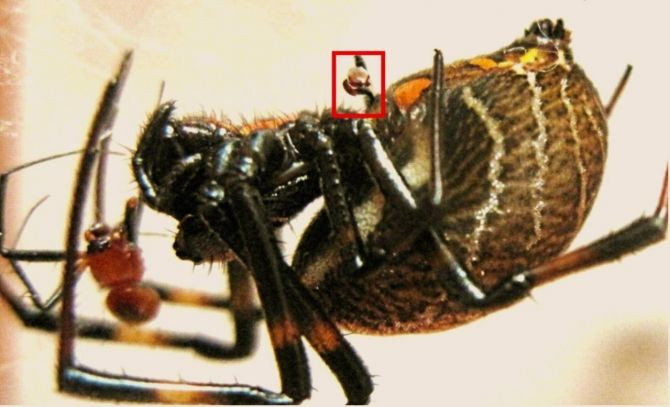Male Spiders Self-Castrate To Boost Chances Of Fatherhood

Male spiders go on a dangerous quest when they copulate with females that have a tendency for sexual cannibalism, which is why male orb-web spiders have developed a “game plan” of severing and scoring with their detachable genitals that have the remarkable capability of functioning unattached from the male spider.
Like many female insects and arachnids, such as black widow spiders and praying mantises, the orb-web spider Nephilengys malabarensis have the habit of devouring males after mating with them, so it would seem reasonable as to why such a seemingly harmful trait of the extreme genital mutilation evolved.
Orb-web spiders have at most two chances to mate in their lives, and researchers found that surprisingly this spider species prefer a female spider’s virginity over her size, which baffled scientists because larger females were usually more fertile.
Scientists believe that the orb-spider’s adaptation to “total genital emasculation” is to enhance their chances of fatherhood and to escape being eaten.
Daiqin Li at the National University of Singapore and his team wrote that this type of spider has a pair of sperm-transferring organs which is equivalent to the penis called “palps”. The spider’s palps detach from their bodies when they disengage from mating, either because the female pushes them away to eat them or when they run away.
Scientists say that this behavior is actually quite common in most spiders, but the breakage is usually manifested in just the tip. However, some male spider species like the orb-spider will completely castrate their entire pedipaps during copulation, researchers said.
This behavior of complete genital sacrifice has been deemed the 'eunuch phenomenon' that scientists have previously thought was just a mistake, since evolutionarily speaking intentional self-sterilization didn’t seem beneficial for males.
Researchers from Singapore raised 25 virgin males and 25 virgin females in a lab until they reached sexual maturity. Investigators then mated the spiders by placing smaller males into female webs, and recorded how long the pairs mated, who stopped mating and how much of the palp broke off.
The results showed that male spiders left the whole palp in the female 88 percent of the time, and about 30 percent of the sperm had been transferred to the females before the breakage.
After mating, researchers left the palp in the female for different amounts of time and found that the male’s detached genitalia continued to transfer sperm even after sex had ended. They found that about 85 percent of the sperm had been transferred to the female when the palp was left in the female for 20 minutes.
Researchers found that it took the females about seven hours to get the palp out, suggesting that “mate-plugging” can serve as an advantage for males to prevent other males from mating with the female.
Researchers also noticed that eunuch males become more aggressive and guard the female, perhaps to make sure the sperm left in their severed palp is successfully transferred to the female.
“It is quite remarkable,” Jutta Schneider, who studies sexual interactions in spiders at the University of Hamburg in Germany said to Nature. “It supports our notion that male spiders of some species are under selection to prolong copulation against the actions of the female.”
Researchers said that this 'eunuch phenomenon' allows males to continue sending sperm to females even after females have devoured or frightened them away.
LI said that this outwardly maladaptive behavior seems to have many benefits. It prevents other males from mating with the female. Eunuch spiders also become better fighters and generally win fights against larger opponents, maybe because they become more agile without their heavy palps or because they become highly motivated to protect their one shot at paternity.
The study was published Feb. 1 in the journal Biology Letters.



























